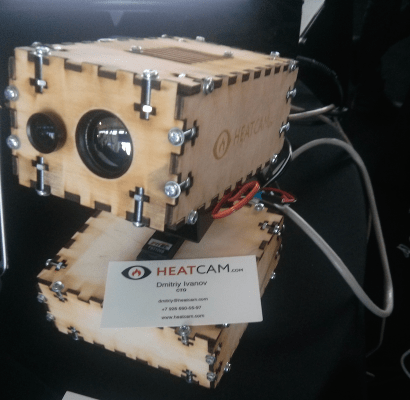Hardware is the new hotness. This has been true for some years now: but today, the acorns planted by Arduino, TechShop, Kickstarter, lean prototyping, etc., are finally beginning to sprout into oaks. The best thing about this year’s Disrupt SF conference was that its Startup Alley boasted far fewer sugar-water SoLoMo apps…and many more nifty hardware start-ups.
On stage, PCH’s Liam Casey described ‘a “renaissance in prototyping” that makes creating hardware prototypes almost as easy as sewing fabric into garments.’ The results were readily apparent:
…along with the pictured HeatCam, a one-man project built around a Kinect at its heart.
There’s hardware hacking happening everywhere I look these days. A couple weeks ago I sampled the work of eight competing robot bartenders at San Francisco’s DNA Lounge. (Here’s video of the event, shot by John Adams.) Meanwhile, over in Kenya:
This isn’t just happening in the Valley. We’re actually far from the heart of hardware prototyping and manufacturing. That honor belongs to Shenzhen, as Joi Ito, director of MIT’s Media Lab, describes in this riveting trip report:
Even if US has the manufacturing capacity, key parts of the knowledge ecosystem currently exist only in Shenzhen […] Just like it is impossible to make another Silicon Valley somewhere else, although everyone tries – after spending four days in Shenzhen, I’m convinced that it’s impossible to reproduce this ecosystem anywhere else.
Tales from a couple of friends of mine who work for the semi-stealth startup OnBeep (they assure me they’re building “Instagram for fax machines”) attest to this. Rapid hardware prototyping can be done anywhere, but if you want to actually manufacture products at scale, Shenzhen is the current, and foreseeable, king of the world.
You can worry about that later, though. If you have a nifty idea and hardware chops, you can now hack together a better, cheaper prototype faster than ever before, and you can probably do it in your garage or around the corner.
Lo these years gone by, I acquired an electrical engineering degree, and promptly abandoned hardware in favor of software, because software was far more lucrative, interesting and powerful. That’s been true ever since — until now. For the first time ever, if I were graduating with the same degree today, I think I’d probably dive deeper into hardware instead. (Not that the line between the two is hard and fast, these days.)
It’s never been easier to make cool stuff, some of which will inevitably turn into terrific new startups. I know, everyone’s worried about burn rates, with reason, and hardware isn’t cheap; but it is more cost-effective than ever before, and it seems that the Shenzhen ecosystem is, bit by bit, almost beginning to become an AWS for hardware. I predict that hardware startups are about to go nonlinear on us — and I look forward to the results with great anticipation.
